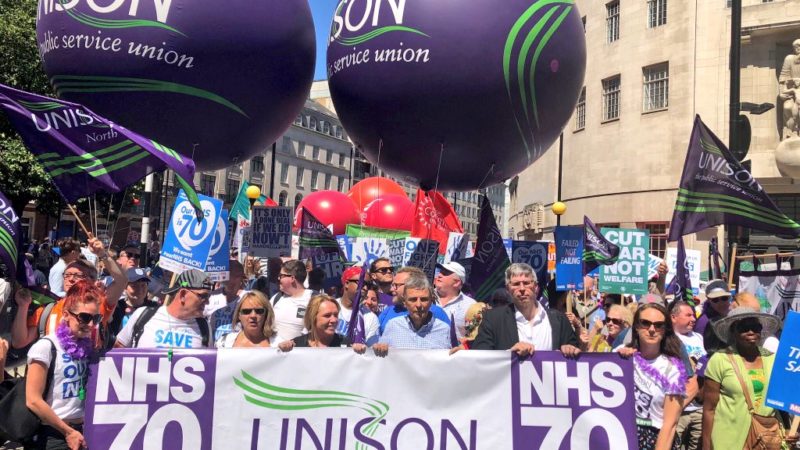
All of the ‘big three’ trade unions affiliated to the Labour Party will soon face general secretary elections, but the first one to get going in earnest is that of UNISON. LabourList has put together a guide to everything you need to know about the UNISON race, from who’s running to each candidate’s policy platform.
Who is in the race?
There are currently five people in the running to succeed Dave Prentis as general secretary next year, but LabourList has only been able to reach four of the campaign teams.
Christina McAnea is the candidate most closely aligned with outgoing general secretary Dave Prentis, under whom she has worked for two years. Currently an assistant general secretary responsible for collective bargaining and negotiation, Glasgow-born McAnea would be the first female leader of the union in its history.
Roger McKenzie, whilst also an assistant general secretary, has distanced himself somewhat from the last administration. The Black Country native and former painter-decorator has highlighted the need for reform at UNISON, of which he has been a member for over a decade.
Paul Holmes, currently a UNISON national executive council member for local government, joined the race after receiving the endorsement of UNISON Action Broad Left, the union’s grassroots left-wing grouping, in August. His campaign has focused on making the union more militant and less bureaucratic. Holmes is currently suspended from his job at Kirklees Council and from UNISON, but is still being allowed to compete in the race.
Hugo Pierre, currently a Black member’s representative on UNISON’s NEC, has worked for Camden Council for 30 years. He is running an independent socialist campaign to be general secretary after missing out on the Action Broad Left nomination.
Peter Sharma is a branch officer and health and safety worker for UNISON in Edinburgh. (If you’re reading, Peter, do get in touch.)
If elected, Sharma, McKenzie and Pierre would all be the first Black leaders of UNISON. Of the candidates, McAnea, McKenzie and Holmes are the most likely to both reach the ballot.
How does it work?
There are four different ways for the candidates to get on the ballot. The easiest route is by being nominated by 25 of the union’s 834 participating local branches. Candidates can also qualify by being nominated by the NEC of the union, two regional councils or two of the union’s nine National Service Groups, which represent the different industries in the union.
UNISON members will then vote on who their preferred candidate is from October 28 to November 27 2020, with a result set to be announced on January 11 2021.
At the time of writing, Christina McAnea has by far the most branch nominations and she has reached the ballot. Roger McKenzie and Paul Holmes are both within a couple nominations of the 25 necessary endorsements to be in the running.
Who has backed the candidates?
Christina McAnea has been supported by several members of the union’s NEC, as well as the East Midlands Regional Council. Despite leading the race, she is yet to receive backing from any prominent political figures.
Paul Holmes has received the support of over 20 of the union’s 75-member NEC, as well as endorsements from former Shadow Chancellor John McDonnell and filmmaker Ken Loach. McDonnell, himself a UNISON member, has described Holmes as a “dedicated rank and file campaigner” and claimed the union was currently being run by a “small elite of unaccountable bureaucrats”.
Roger McKenzie has received an array of endorsements from prominent Labour politicians, including former leader Jeremy Corbyn, Diane Abbott and Kate Osamor. He was also backed by Labour MP Dawn Butler at a campaign event on Monday. She called the decision a “no brainer” and said a vote for McKenzie was a “practical thing” supporters of Black Lives Matter could do to bring about change.
Hugo Pierre has received the endorsement of the Socialist Party, of which he is a member.
What are they campaigning on?
Christina McAnea has been stressing her skills as a negotiator during the campaign, and her past successes working with both government and employers to achieve better pay and conditions. She has committed herself to backing workers affected by Covid, and has said she will make the union campaign for a national care service.
Roger McKenzie has largely focused his campaign on reforming and democratising the union to try to increase membership and participation. The turnout in the last leadership election was less than 10%, and in UNISON’s other internal elections participation is even lower. He has also pledged to increase the union’s media profile and increase the number of union activists to 100,000.
Paul Holmes’ campaign has centred around making UNISON more openly political and prepared to go on strike – what he has termed “a shouting union”. His main pledge is to take a worker’s salary of £32,000 and donate the extra £100,000 of the general secretary’s pay package to the union’s own welfare fund. He has also suggested the union sell its two office buildings in London and move its HQ to the Midlands.
Hugo Pierre has matched that worker’s wage pledge. He has also said he would advocate the union being “more foe than friend” to Labour, even suggesting UNISON should stand council candidates against unsupportive Labour incumbents.
Why does it matter to Labour?
UNISON under Dave Prentis has been hugely supportive of Keir Starmer as the new Labour leader, endorsing him in the leadership race as well as former UNISON rep Angela Rayner for the role of deputy. From its votes on Labour’s NEC to its position as one of Labour’s largest donors, the change in direction that has been backed by candidates on the union’s left could heavily shape Starmer’s tenure as leader and Labour’s chances in a future general election.




More from LabourList
Nudification apps facilitate digital sexual assault – and they should be banned
Diane Abbott suspended from Labour after defending racism comments
Labour campaign groups join forces to call for reinstatement of MPs